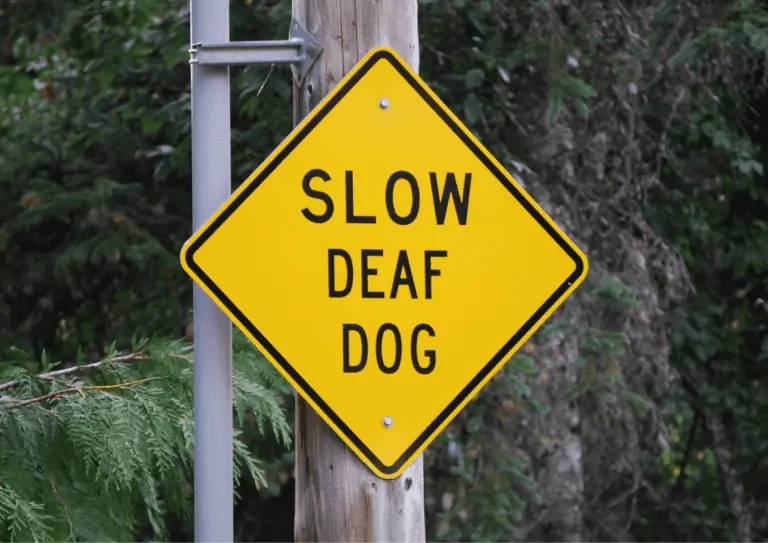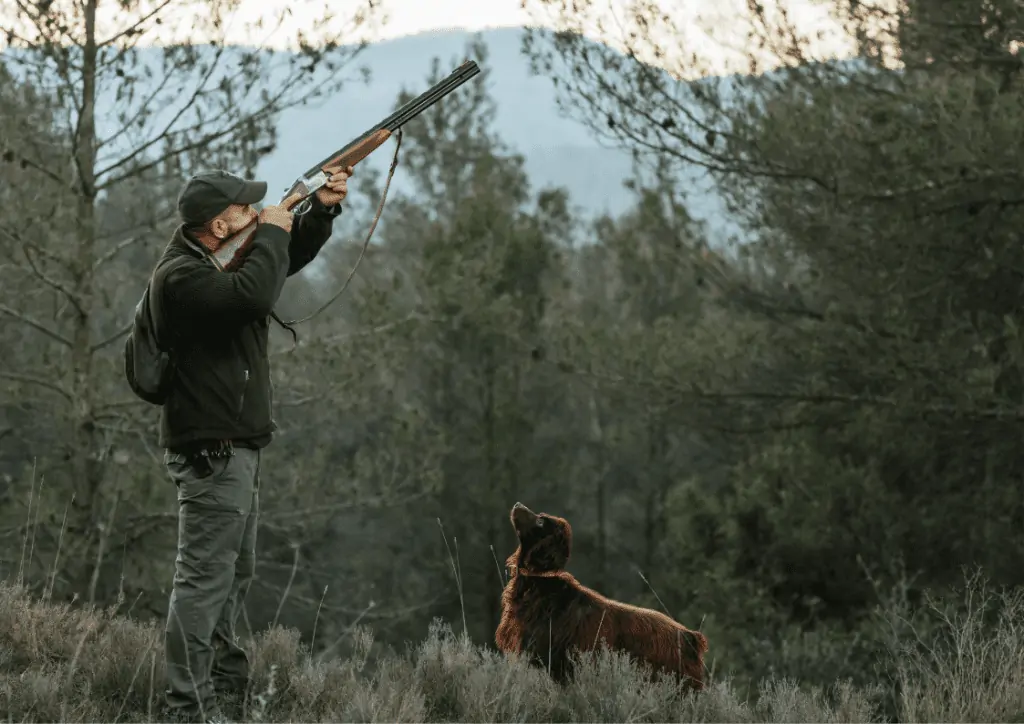Thanks in part to their keen sense of hearing, dogs have accompanied human hunts for thousands of years.
However modern hunts are extremely likely to involve a rifle or shotgun, and because of this we must consider whether hunting sports which require a gun might be harmful to a dog’s ears.
Gunshots are capable of hurting a dog’s ears as they often generate sounds greater than 150dB when fired. Being exposed to even intermittent noises (such as gun fire) at this sound intensity can permanently damage a dog’s hearing and lead to partial deafness. Any sound greater than 85dBA has the potential to be harmful to a dog.
Lifting examples from a number of hunting disciplines we cover the essentials you need to know to protect your canine companion’s hearing.
How does gunfire damage a dog’s ears?
Several case studies have proven that just like humans, dogs, too, can suffer hearing loss from gunfire thanks to the impact loud noises have upon our inner ears.
Often, hearing loss in dogs occurs due to damaged hair cells in the cochlea, which vibrate in reaction to sound waves.
Any sounds above a 120 -140 decibel range can immediately have damaging and lasting effects on your dog’s hearing. In fact, just like humans, sounds greater than 85dB can result in impaired hearing if exposed to loud noises continuously for long periods of time.
With many hunting rifles and shotguns producing sounds that are 150dB and over when fired, going hunting with your dog brings with it a very real risk of damaging your dog’s hearing.
Are some hunting dogs more at risk of hearing impairment than others?
When you pull the trigger of a gun, the sound of that shot and the negative impact on hearing will be relatively uniform across dog breeds; still, some dogs are more at risk of hearing damage than others.
Retrievers, for example, are far more likely to be positioned next to the shooter when the gun is fired than pointers or flushers who will be much further away.
When you think about the impact on your dog’s hearing, you need to consider what type of dog they are and where they are most likely to take up position during the hunt.
Any dog closer to the gun at the time of firing will be more susceptible to the detrimental effects of the sound it produces
Do hunting dogs really need ear protection?
As hunters, we take the necessary precautions to protect our ears against the harmful effects of repetitive gunshot sounds, and we must consider doing the same for our canine companions.
Knowing that any sound above 85dBA can be harmful, and that popular hunting rifles generate sound pressure levels of above 150dB, the aim is to reduce this impact as far as is practicable.
The table below shows decibel ratings for popular rifles (collated by Go Hunt) and by using a distance attenuation calculator we can see that even after creating a buffer of 10m between the muzzle and your dog, it’s ears will still be exposed to a dangerous level of sound pressure when the gun is fired.
Hunting Rifle | dB Rating | dB at 2m (e.g. dog by your side) | dB at 10m (e.g. dog a short distance away) |
Winchester Model 70 | 166.5 | 160.48 | 146.5 |
Remington Model 742 | 163.6 | 157.48 | 143.5 |
Browning X-Bolt | 161.4 | 155.38 | 141.4 |
Ruger Model 1 | 160.1 | 154.08 | 140.1 |
Colt AR-15 | 158.9 | 152.88 | 138.9 |
How can I protect my dog’s ears against gunshot sounds?
There are some semi-decent products on the market that cater for dog hearing protection, but these bring about their own set of impracticalities so educating yourself and your hunting partners is one of the best ways to protect your canine.
The easiest way to protect your dog’s ears is to increase the distance between them and the muzzle.
Knowing that sound pressure reduces by 6 decibels every time distance doubles, and that most popular hunting rifles generate a peak noise of over 150dBA you’ll want to try and establish at least a distance of 30m between you and your dog if no other hearing protection measures are in place.
If you shoot from a permanent blind and cannot have your dog separated by 30m, try adding sound-deadening materials to the dog blinds; this shield can be a significant barrier between harmful sounds and your dog’s ears.
When you’re out hunting, try to keep your dog by your side to prevent others from shooting over your dog thus exposing them to blasts from more than just your own gun.
Most importantly, never shoot over a dog or when a dog is positioned in front of your gun. Not only is this a huge safety risk for the dog’s life, but in terms of sound exposure, it is the most dangerous place for them to be.

What hearing protection products are available for hunting dogs?
The thing with hunting dogs is that as a responsible owner, you want to protect their hearing; still, you don’t want to limit your dog’s hearing too much or select a product that could move, fall off, or block its vision.
There are some products that you can use to protect your dog’s hearing from gunshots. These include:
- Mutt Muffs: Similar to ear muffs for humans, these products cover your dog’s ears and stay in place with adjustable straps. Most evidence for their effectiveness is anecdotal, but several users claim that the product is challenging to fit and might not be as effective as they would like.
- Happy Hoodie: This sleeve goes over your dog’s head, pinning their ears down to the sides. There are several favorable reviews on Amazon, but it’s pretty easy for this product to slip off during a hunt.
- In-ear hearing protection: This product may be the most effective at reducing the noise entering your dog’s ears and staying in place, but you should never attempt to place this device into your dog’s ear without consulting with a vet first.
How harmful is loss of hearing to a hunting dog?
Many dogs experience sensory deterioration over time, just as humans do. While this can be a disorienting experience, dogs adapt to a reduced sense of hearing fairly well, far better than if their sense of smell were to deteriorate.
Still, hearing loss can cause stress in your canines and make them less responsive to external sounds that could threaten them – such as an oncoming car or a predator. It’s better to protect your dog’s hearing and allow them to maintain a high level of sensory perception for as long as possible.
Final thoughts
Dogs aren’t so different from humans, and when it comes to loud noises, we can experience the harmful impacts on our sense of hearing.
At over 150dBA, the noise produced by gunshot can be especially hazardous to a hunting dog’s ears. Experiencing sound pressure of this level from a short distance away has the potential to cause immediate damage, and will almost certainly result in hearing impairment over the long run if you and your dog hunt regularly.







